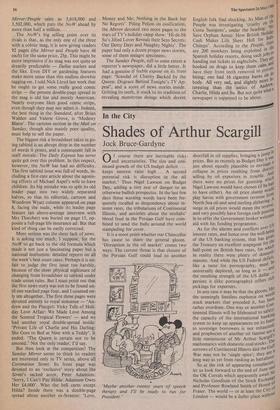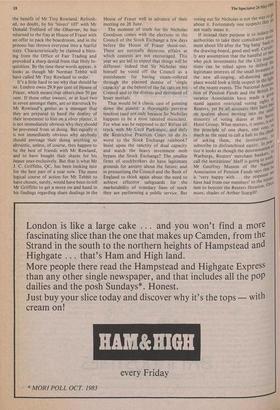In the City
Shades of Arthur Scargill
Jock Bruce-Gardyne
fl f course there are inevitable It is a moot point whether our Chancellor has cause to share the general gloom. 'Disruption in the oil market' comes two ways. The current threat is that closure of the Persian Gulf could lead to another 'Maybe another twenty years of speech therapy and I'll be ready to run for President.' shortfall in oil supplies, bringing a PO in prices. But as recently as Budget Day it „ just about equally plausible to envisage as collapse in prices resulting from distfe,,d selling by oil exporters in trouble. API, there were no prizes for guessing vilihicd Nigel Lawson would have chosen (if hel,aid to have either). An oil price slump wei"„, play havoc with government revenue fr°"'A North Sea oil and send sterling slithering• surge in oil prices would mean the revels ' and very possibly have foreign cash pour' e in to offer the Government broker welconi aid with his funding programme.
Us
As for the alarms and conflicts over interest rates, and hence over the well-he"; of the US banking system, that has givelie the Treasury an excellent scapegoat for t.ch half-point on British base rates, for will.e in reality there were plenty of domes„' reasons. And while the US Federal deficit' like a taste for pornography, must „bed universally deplored, so long as it — an. the resulting strength of the US dollar persists it (like pornography) offers rich pickings for exporters.
like
In any case it may be that the gloom, the seemingly limitless euphoria on wc",, stock markets that preceded it has been rather overdone. One way or another Con- tinental Illinois will be lifeboated to safety' the capacity of the international bolo!): system to keep up appearances on its 100, to sovereign borrowers is not exhaust en; and prophecies of another oil famine are„8, little reminiscent of Mr Arthur Scargill mathematics with domestic coal stocks. Tilief sorrows of Continental Illinois and the 61/4, War may not be 'single spies"; they are long way as yet from ranking as battalions. So at the risk of appearing comPlacellt:3 let us look forward to the end of June an the OK Corrals which apparently await Sir Nicholas Goodison of the Stock Exchange, and Professor Rowland Smith of House M, Fraser. The world — or at least the City 01_ London — would be a duller place without the benefit of Mr Tiny Rowland. Refresh- ed, no doubt, by his 'lovers' tiff' with Mr Donald Trelford of the Observer, he has returned to the fray at House of Fraser with an offer to pack the boardroom, and in the process has thrown everyone into a fearful tizzy. Characteristically he claimed a bless- ing from the Office of Fair Trading and provoked a sharp denial from that Holy In- quisition. By the time these words appear, it looks as though Mr Norman Tebbit will have called Mr Tiny Rowland to order.
It's a little hard to see why that should be so. Lonhro owns 29.9 per cent of House of Fraser, which means that others own 70 per cent. If those other owners, or at least two in seven amongst them, are so starstruck by Mr Rowland's genius as a manager that they are prepared to hand the destiny of their investment to him on a silver platter, it is not immediately obvious why they should be prevented from so doing. But equally it is not immediately obvious why anybody should envisage their doing anything so altruistic, unless, of course, they happen to be the best of friends with Mr Rowland, and to have bought their shares for his beaux yeux exclusively. But that is what Mr J. C. Griffiths, QC, has been looking into for the best part of a year now. The more logical course of action for Mr Tebbit to have chosen, surely, would have been to tell Mr Griffiths to get a move on and hand in his findings regarding share dealings in the
House of Fraser well in advance of their meeting on 28 June.
The moment of truth for Sir Nicholas Goodison comes with the elections to the Council of the Stock Exchange a few days before the House of Fraser shoot-out. These are normally decorous affairs at which contests are not encouraged. This year we are led to expect that things will be different: indeed that Sir Nicholas may himself be voted off the Council as a punishment for having steam-rollered through the planned demise of 'single capacity' at the behest of the fat cats on his Council and to the distress and detriment of lesser mortals.
That would be a classic case of gunning down the pianist: a thoroughly perverse reaction (and not only because Sir Nicholas happens to be a most talented musician). For what was he supposed to do? Refuse all truck with Mr Cecil Parkinson, and defy the Restrictive Practices Court to do its worst to the Stock Exchange rulebook? Insist upon the sanctity of dual capacity and watch the heavy investment mob bypass the Stock Exchange? The smaller. firms of stockbrokers do have legitimate grounds for anxiety about the future: and in pressurising the Council and the Bank of England to think again about the need to achieve effective safeguards for the marketability of scondary lines of stock they are performing a public service. But
The Spectator 26 May 1984 voting out Sir Nicholas is not the way t°° about it. Fortunately one suspects not really mean it. they If instead their purpose is to induce the authorities to take their consultative &ell° ment about life after the 'big bang' back! the drawing-board, good and well. Certaltili ly any assumption that the handful of °I.e.. pick investments be reh e relied u for the Cityd einrids e th twiohnos tlegitimatehe new interestsall_all-singing, nog, of the all-dancing iinvestorsng ui ait.khocitt place would look a little suspect in the of the recent events. The National Assocla . tion of Pension Funds and the British Pi surance Association have made a great stand against restricted voting rights d Reuters, yet by all accounts they have all no qualms about moving into the stilans, minority of voting shares at the Sav-o't Hotel Group. What matters, it seems, Is „ the principle of one share, one much as the need to call a halt to the chec; of asking them, the institutions. c, subscribe to disfranchised equity. irlPrad tice it looks as though the determination Warburgs, Reuters' merchant bankers, to call the institutions' bluff is going to w.,,rai Mr Geoffrey Musson of the Nall°"he Association of Pension Funds says lila' t is 'very happy with the response. vote, 5). have had from our members' to the inJulic'e tion to boycott the Reuters flotation. Cie more, shades of Arthur Scargill!















































 Previous page
Previous page